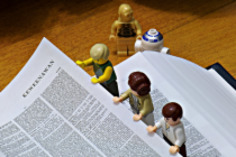Apple's decision to reject an e-book by Seth Godin because it contains hyperlinks to books in the Amazon store is just another example of how the oligopoly that controls the market for e-books is turning the landscape of reading into a walled garden.
***
Just as a few massive chain stores eventually came to dominate the traditional printed book market in North America, the e-book marketplace is a kind of oligopoly involving a few major players — primarily Amazon, Apple and Barnes & Noble. And while bookstore owners of all kinds are free to decide which books they wish to put on their shelves, these new giants have far more control over whose e-books see the light of day because they also own the major e-reading platforms, and they are making decisions based not on what they think consumers want to read but on their own competitive interests. That is turning the e-book landscape into even more of a walled garden.
Author and digital-marketing maven Seth Godin highlighted this issue in a recent blog post, in which he described how his new book was turned down by Apple because it contained hyperlinks to books sold by Amazon (with whom Godin has a partnership). According to a letter that the author says he received from the company, the new title — Stop Stealing Dreams, a book about the transformation that Godin believes needs to happen in public education — was rejected by Apple due to what the letter described as “multiple links to [the] Amazon store.” Godin notes that the book had links to related works, including Too Big to Know from David Weinberger, co-author of The Cluetrain Manifesto.
Via Heiko Idensen



 Your new post is loading...
Your new post is loading...























